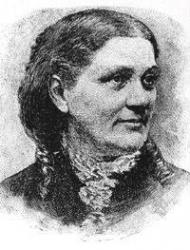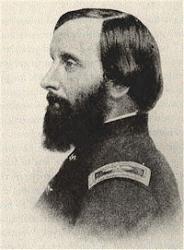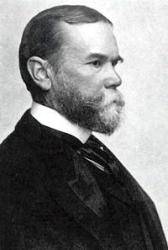Planning worship?
Check out our sister site, ZeteoSearch.org,
for 20+ additional resources related to your search.
- |
User Links
Person Results
William Henry Furness

1802 - 1896 Person Name: Rev. William Henry Furness (1802- ) Author of "Feeble, helpless, how shall I" in Hymnal Amore Dei Furness, William Henry, D.D., born in Boston, 1802, and graduated at Harvard in Arts and Theology, 1820. From 1825 he has been an Unitarian Pastor in Philadelphia. He is an accomplished scholar, and has been an active worker in reforms of various kinds. His publications are numerous and
include a Manual of Domestic Worship, 1840, and a translation of Schiller's Song of the Bell.
His hymns are somewhat numerous, and several of them have great merit. The best and most widely used are:—
1. Father in heaven, to Thee my heart. Resignation. Appeared in The Christian Disciple, 1822. It was repeated in this form in some of the older collections, and a few modern hymnals, including the Boston Unitarian Hymns [& Tune] Book, 1868. In 1846 it was given in Longfellow and Johnson's Book of Hymns as "Father in heaven, to Whom our hearts;" again in their Hymns of the Spirit, 1864, and in Dr. Martineau's Hymns of Praise & Prayer, 1873. This hymn is sometimes ascribed to "H. Ware," but in error.
2. Feeble, helpless, how shall I? Jesus our Leader. First published in the Cheshire Unitarian Christian Hymns, 1844, No. 272, in 5 stanzas of 4 lines. It is in several modern collections, including Lyra Sacra Americana, 1868: Thring's Collection, 1882.
3. Have mercy, 0 Father. Divine direction desired. Contributed to Dr. Martineau's Hymns of Praise and Prayer, 1873, in 2 stanzas of 6 lines.
4. Here in a world of doubt. Psalms xlii. Contributed to the N. Y. Lutheran Collection, 1834, and repeated in his Manual of Domestic Worship, 1840, Martineau's Hymns, &c, 1873.
5. Here in the broken bread. Holy Communion. Appeared in the Appendix to the Philadelphia Unitarian Collection, 1828. It is in a few modern collections, including the Boston Unitarian Hymn [and Tune] Book, 1868.
6. Holy Father, Gracious art Thou. Purity & Peace. Contributed to Dr. Martineau's Hymns, &c, 1873, in 1 stanza of 12 lines.
7. I eel within a want. Likeness to Christ desired. Appeared in the Cheshire (U. S.) Unitarian Christian Hymns, 1844, No. 687, in 4 stanzas of 4 lines. It is in a few collections both old and new.
8. In the morning I will raise [pray] . Morning. Appeared in his Manual of Domestic Worship, 1840, in 6 stanzas of 4 lines, and repeated in Dr. Martineau's Hymns, &c, 1873. In Longfellow and Johnson's Book of Hymns, 1846, and the Boston Unitarian Hymn [& Tune] Book it begins with stanzas ii., "In the morning I will pray."
9. 0 for a prophet's fire. Holy Communion. Published in the Appendix to the Philadelphia Unitarian Collection, 1828, and repeated in the Cheshire (U. S.) Unitarian Christian Hymns, 1844, and later hymn-books.
10. Richly, O richly have I been. The Prodigal Son. In his Manual of Devotion, 1840. In Longfellow and Johnson's Book of Hymns, 1846, and their Hymns of the Spirit, 1864, it is given as "O richly, Father, have I been"; whilst in Hedge & Huntington's Hymns for the Church of Christ, 1853, the Boston Unitarian Hymns [and Tune] Book, 1868, and others, it opens with stanzas ii., "Unworthy to be called Thy son."
11. Slowly by Thy [God's] hand unfurled. Eternal Light. Given in his Manual of Domestic Worship, 1840, and repeated in a few hymnals. In Drs. Hedge & Huntington's Hymns for the Church of Christ, 1853, the first line was changed to “Slowly by God's hand unfurled." This is the reading of the Boston Unitarian Hymn [& Tune] Book, 1868. Dr. Martineau retains the original reading in his Hymns, &c, 1873.
12. Thou only Living, only True. Ordination. In Dr. Martineau's Hymns, &c, 1873, where it is dated 1868.
13. To the High and Holy One. Consecration of Church. In Lyra Sacra Americana, 1868. From this is taken "To the truth that makes us free" (stanzas ii.), in the Boston Hymns of the Spirit, 1864.
14. What is the world that it should share? Invocation of the Spirit. Given in The Christian Disciple, 1822, and Dr. Martineau's Hymns, &c, 1873. It begins with stanza ii. of his hymn "Here in Thy temple, Lord, we bow." In Lyra Sacra Americana it reads, "Oh, is there aught on earth to share."
15. What is this that stirs within? The Soul. Appeared in his Manual of Domestic Worship, 1840. In 1844 it passed into the Cheshire (U.S.) Unitarian Christian Hymns, No. 318, and later into numerous collections, both old and new. Furness died in 1896. [Rev. F. M. Bird, M.A.]
--John Julian, Dictionary of Hymnology (1907)
===================
Furness, W. H., p. 402, ii. His Verses, Translations, and Hymns were published 1886. Of his hymns the following, in addition to those on pp. 402-3, have come into common use:—
1. She is not dead, but sleepeth. [Death and Burial.]
2. That God is Love, unchanging Love. [God is Love.] This is in several American collections, including the Boston Unitarian Hymns for Church and Home, 1895, where it is dated 1892.
3. Thou Who dost all things give. [Seeing the Unseen.] This is dated in The Pilgrim Hymnal, 1904, as having been written in 1860. It is from the Author's Verses, &c, 1886. Also in Border's Treat. of Amer. Sacred Song, 1896.
Dr. Furness was b. April 20, 1802, and d. in 1896.
--John Julian, Dictionary of Hymnology, New Supplement (1907)
William Henry Furness
Lucy Larcom

1824 - 1893 Author of "I said it in the meadow-path" in Isles of Shoals Hymn Book and Candle Light Service Larcom, Lucy, was born at Beverley Farm, Massachusetts, in 1826. Her Poems were published in 1864. Her hymn, "When for me the silent oar" [Death Anticipated), was published in 1868. She died in 1893.
--John Julian, Dictionary of Hymnology, Appendix, Part II (1907)
===============
Larcom, Lucy, p. 1576, ii. The extended use of this writer's hymns justifies a more detailed account of her life and work than is given on p. 1576. She was born in 1824, and worked from 1837-45 in the mills of Lawrence, Mass., then engaged in elementary teaching 1846-49, became a student at Monticello Female Seminary, Alton, Ill., 1849-52, and then entered upon advanced teaching in higher-class schools, and literary work. She edited with J. G. Whittier, Child Life in Poetry, 1871; Child Life in Prose, 1873; Songs of Three Centuries, 1875, &c. Her own works are Poems, 1869; Childhood Songs, 1875; Wild Roses of Cape Ann, 1881; Poetical Works, 1885; At the Beautiful Gate; And Other Songs of Faith, 1892. Her autobiography was published as A New England Girlhood. She died in 1893. In addition to "When for me the silent oar," of her hymns the following are in common use:—
i. From her Poems, 1869.
1. Hand in hand with angels. Angelic companion¬ship.
2. If the world seems cold to you.
3. When for me the silent oar. Death
ii. From her Wild Roses of Cape Ann, 1881.
4. In Christ I feel the heart of God.
5. O Spirit, "Whose name is the Saviour.”
in. From her Poetical Works, 1885.
6. Breaks the joyful Easter dawn, master.
7. Heavenly Helper, Friend Divine. Christ the Friend.
iv. From her At the Beautiful Gate, &c, 1892.
8. Draw Thou, my soul, O Christ. Looking to Jesus.
9. O God, Thy world is sweet with prayer. Prayer.
10. Open your hearts as a flower to the light.
11. King, happy bells of Easter time. Easter.
The above notes are from the British Museum copies of Miss Larcom's works.
--John Julian, Dictionary of Hymnology, New Supplement (1907)
Lucy Larcom
Thomas W. Higginson

1823 - 1911 Person Name: Thomas Wentworth Higginson Author of "To Thine eternal arms, O God!" in Songs of the Christian Life Higginson, Thomas Wentworth, M.A., was born at Cambridge, U.S.A., Dec. 22, 1823, and educated at Harvard. From 1847 to 1850 he was Pastor of an Unitarian Church at Newburyport, and from 1852 to 1858 at Worcester. In 1858 he retired from the Ministry, and devoted himself to literature. During the Rebellion he was colonel of the first negro regiment raised in South Carolina. In addition to being for some time a leading contributor to the Atlantic Monthly, he published Outdoor Papers, 1863; Malbone, 1869; and other works. During his residence at the Harvard Divinity School he contributed the following hymns to Longfellow and Johnson's Book of Hymns, 1846:—
1. No human eyes Thy face may see. God known through love.
2. The land our fathers left to us. American Slavery.
3. The past is dark with sin and shame. Hope.
4. To Thine eternal arms, O God. Lent.
In the Book of Hymns these hymns are all marked with an asterisk. They, together with others by Mr. Higginson, are given in Putnam's Singers and Songs of the Liberal Faith, 1875. [Rev. F. M. Bird, M.A.]
-- John Julian, Dictionary of Hymnology
Thomas W. Higginson
John Hay

1838 - 1905 Author of "Lord! from far-severed climes we come" in Hymns of Worship and Service Hay, John, diplomat and author, born at Salem, Ind., Oct. 8, 1838; graduated at Brown University 1858; admitted to the 111. Bar; was private secretary to Pres. Lincoln; served in the Civil War; member of the Legation at Paris, Madrid, and Vienna, and Ambassador at the Court of St. James. In 1879-81 he was First Assistant Sec. of State, and from 1898 Sec. of State in the Cabinets of Presidents McKinley and Roosevelt, to his death July 1, 1905. His publications included Castilian Days, 1871; and, with J. G. Nicolay, Abraham Lincoln: A History, 10 vols., 1887, &c. In 1871 he also published Pike County Ballads, and in 1890 Poems. Of his poems the following are in common use as hymns:—
1. From Sinai's cloud of darkness. [Law and the Gospel.] This begins with st. ii. of his poem, “Sinai and Calvary," in Poems, 1890, p. 152. Asked for its date and origin, Mr. Hay said: "I wrote the hymn several years ago, because I felt like it. I can say nothing more intelligible than that." It was included iu the New Laudes Domini, N.Y., 1892.
2. Lord, from far-severed climes we come. [Work on for God.] In the summer of 1895, at his summer home at Lake Sunapee, Mr. Hay was asked to write a hymn for the opening of the 15th International Christian Endeavour Convention, at Washington, the following year, but declined on the ground that his verse-writing days were past. But in the following spring he sent this hymn, with the statement that there was no obligation to use it. In his manuscript it is entitled "An Invocation." It was sung at the opening of the Convention of 1896, and again at the Convention on July 4, 1905, when the opening exercises assumed the form of a memorial service, as his body was being borne to the grave. It is in several American collections. In The Methodist Hymnal, N.Y., 1905, it opens with st. ii., “Defend us, Lord, from every ill." The original is in 4 stanzas of 4 lines.
3. Not in dumb resignation. [Submission.] Appeared in 3 stanzas of 8 lines in Harper's New Monthly Magazine, Oct. 1891, and entitled "Thy will be done." Given with alterations in Dr. L. Abbott's Plymouth Hymnal, N.Y., 1894.
Mr. Hay was for some time an office-bearer in the Presbyterian Church of the Covenant, Washington, D.C. [Rev. L. F. Benson, D.D.]
--John Julian, Dictionary of Hymnology, New Supplement (1907)
John Hay
Charles S. Newhall
1842 - 1935 Author of "O Jesus, Master, When Today" in The Cyber Hymnal Born: October 4, 1842, Boston, Massachusetts.
Died: April 11, 1935, Berkeley, California.
Newhall attended Amherst College and Union Theological Seminary, and was ordained a Congregational minister. He pastored over 25 years, then became associated with the United States Forestry Service and developed a reputation as an outstanding naturalist. He retired in 1905 to Berkeley, California.
--Reynolds, William Jensen. Hymns of Our Faith. Nashville, Tennessee: Broadman Press, 1964.
http://www.hymntime.com/tch/bio/n/e/w/newhall_cs.htm
Charles S. Newhall


 My Starred Hymns
My Starred Hymns


